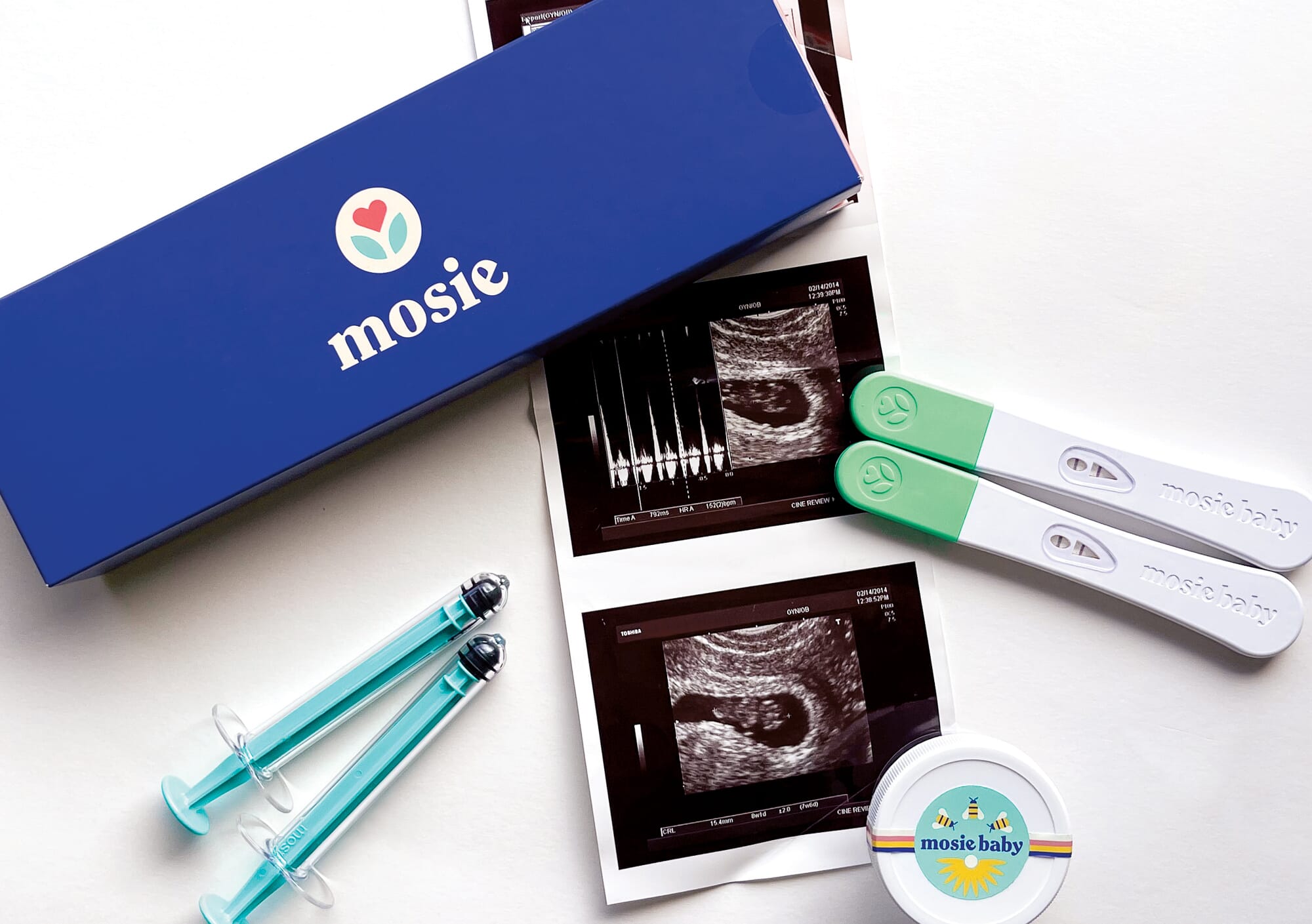Trying to conceive and stuck choosing between IUI and timed intercourse? Here’s the deal: both aim for the same outcome (baby), but the how, when, and where are very different. Timed intercourse happens in the comfort of your bedroom, while IUI involves a fertility clinic and a bit more hands-on help.
So, how do you know which path is right for you?
Let’s break it all down — success rates, costs, time commitment, and how each option might fit into your fertility story.
What is timed intercourse?
For many couples, timed intercourse is the first stop on the TTC (trying to conceive) journey. It simply means having sex during your most fertile window — the days leading up to and including ovulation (and a day or two after).
To make this work, you'll need to track ovulation. That might mean using an app, peeing on ovulation predictor kits (OPKs), checking your basal body temperature (BBT), or paying close attention to cervical mucus. Most people rely on OPKs, which detect a surge in luteinizing hormone (LH) — a signal that ovulation is just around the corner. Once you see a positive test, aim to have sex that day and the next. Ideally, you'd even get started the day before that first positive result to give sperm a head start (this is where tracking your cervical mucus or using a fertility tracking app can help). It’s a popular method of ovulation tracking, with 55% of our Rescripted community using OPKs to track their fertility.
If you’re not sure when to start testing, try four to five days before your expected ovulation day. A positive OPK (when the test line is as dark or darker than the control) means you're at peak fertility. Having sex the day before and the day of your peak gives you the best chance of conception, but a study from the 90s also suggests that sex “at least a couple of times per week… [has] the greatest chance of resulting in a pregnancy” when it comes to timed intercourse.
According to one study, “Proper information [about timed intercourse] is likely to reduce time to conception for many couples, and also to reduce unnecessary intervention and cost.”
Does timed intercourse work if I have irregular cycles?
If your cycle isn’t regular, timed intercourse can be trickier. You might need to test for longer each month, or speak with your doctor about additional support — like ovulation-inducing medications or a monitored cycle.
How successful is timed intercourse?
It’s hard to put a specific figure on this, as there are so many variables, but a 2015 study suggests that “the chance of success following timed intercourse [is] between 9 and 33%.” But age, ovulation consistency, sperm quality, and how accurately you time things all play a role.
What is IUI (intrauterine insemination)?
IUI is a fertility treatment that gives sperm a shortcut. Instead of relying on sperm to make the full journey through the cervix on their own, IUI involves placing specially “washed” sperm directly into the uterus using a soft, flexible catheter. This process concentrates the healthiest sperm and puts them closer to the egg — essentially giving them a running start.
The procedure itself is quick and typically painless. You’ll lie on an exam table while a provider inserts a speculum (just like during a Pap smear), then threads a thin catheter through your cervix to deposit the sperm. The whole thing usually takes less than five minutes, and many people go straight back to their day afterward.
When is IUI done?
Timing is everything when it comes to intrauterine insemination. IUIs are usually scheduled 24 to 36 hours after a positive ovulation test (OPK) or after receiving an hCG “trigger shot” to prompt ovulation. If you’re using frozen sperm, some providers recommend doing two inseminations in one cycle — one around 12–24 hours after the OPK and another closer to the 36-hour mark.
Does IUI work if I have irregular cycles?
If your cycle is unpredictable, IUI can still be a great option — especially when paired with ovulation-stimulating medications and ultrasound monitoring. Your doctor may recommend this combo to help pinpoint ovulation more accurately and increase your chances of conception.
How many IUIs should I try before IVF?
It varies. Some people get pregnant after one or two IUIs, but others may need to try 3 to 6 cycles before considering IVF. Your provider will usually reassess after a few rounds to see if a new approach is needed.
How successful is IUI?
Just as with timed intercourse, IUI success depends on several factors — age, diagnosis, and whether or not you’re using fertility meds. On average, natural-cycle IUIs have a success rate of around 20-25%, erring on the higher end of the scale with more IUI cycles, but some studies have suggested it’s closer to 10-20%. With medications like Clomid or Letrozole, that can also bump up the success to the mid-20s.
When timed intercourse might be the right first step
Timed intercourse is typically most hetero couples’ first step when it comes to trying to conceive — you can do it easily from home, using (relatively) cheap resources like ovulation predictor kits (OPKs). It’s ideal if:
- You’ve just started TTC
- You have regular cycles and no known fertility conditions
- You want a low-cost, non-invasive approach first
- Your partner has good sperm health
Timed intercourse can be a great starting point — but after 6–12 months (or sooner if you’re over 35), it might be time to explore other options.
When IUI might be a better fit
If you’ve been TTC for a while, it can be worth speaking with your doctor or a fertility clinic, who may suggest IUI if:
- Your partner has been diagnosed male factor infertility (low motility, morphology, or count)
- You’re experiencing unexplained infertility
- You have cervical mucus issues or PCOS
- You are a same-sex couple or a single person using donor sperm
- You’ve been trying to conceive for 12 months with no positive pregnancy test
- You’re already on ovulation meds to boost egg release
In many of these cases, IUI bumps up your chances by getting more sperm closer to the egg — especially if timing or cervical barriers have been working against you.
Can you combine approaches? Yep.
You don’t have to pick one method and stick to it forever. In fact, many people combine treatments to increase their chances of conception.
One common path is starting with timed intercourse alongside fertility meds like Clomid or Letrozole. These medications help stimulate ovulation, which means more eggs — and more opportunities for sperm to meet one.
If ovulation is irregular or other fertility factors are at play, some people move on to IUI while continuing the same medications. This combo is especially helpful for those who need more precise timing or a little extra hormonal support.
It’s also common to begin with home insemination — especially when using a known donor — and then progress to IUI if conception doesn’t happen after a few tries. This graduated approach gives you the flexibility to start simply and escalate care only if needed.
Can I try timed intercourse before doing IUI?
Yes, you can. If you’re early in your TTC journey and don’t have any known fertility issues, timed intercourse is a great place to start. It’s non-invasive, affordable, and gives you a chance to understand your cycle before moving on to medical treatments. And if it doesn’t work after a few cycles? You’ve got more options — like IUI — ready when you are.
Other options to consider
Timed intercourse and IUI aren’t the only options to consider before going down more invasive medical routes — there’s also at-home insemination and fertility medication to consider.
At-home insemination (ICI)
If you have a known donor or a partner who has sperm, home insemination (ICI) can be another effective option for your baby-making journey. Home insemination can also work if you are using ICI-ready frozen sperm from a bank. Home insemination, also known as Intracervical Insemination and sometimes called “The Turkey Baster Method”, is a method that places sperm directly at or near the cervical opening with the goal of conception. There are many ways to inseminate at home, and each has varying degrees of success. This can be a great option to try at home before moving on to more costly, invasive options.
When inseminating at home using fresh sperm, it’s important to inseminate within one hour of ejaculation. Some sperm can survive outside of the body for many hours, but some have a shorter life cycle (each person’s body is different), so it’s best to use it on the earlier side.
A note on anatomy: Your cervix is the opening of your uterus which is situated at the top of your vagina. So, when inseminating at home, the goal is to put the semen as far into the vagina as possible, right near the cervix.
Mosie Baby is an inclusive brand that makes a syringe designed exactly for this purpose, with a barrel-free tip and an opening that mirrors the anatomy of the cervix. Mosie has been clinically proven to have success rates equivalent to timed intercourse and intrauterine insemination (IUI). And you can use Mosie with fresh or frozen sperm! If you’re interested in trying The Mosie Kit for home insemination, use code RESCRIPTED10 for 10% off your next purchase.
Medicated cycles
Medicated cycles are an option worth considering if you’re hoping to increase your chances of conception. With a medicated cycle, your fertility doctor will make sure your fallopian tubes are open through a hysterosalpingogram, and prescribe medications like Clomid, Femara, or gonadotropin injections. These medications help regulate your cycle if it’s irregular and can also be used to help you ovulate more than one egg.
Before beginning a medicated cycle, your doctor will want to perform an initial ultrasound (typically a transvaginal ultrasound) to make sure that you don’t have any ovarian cysts. Once this is ruled out, they will prescribe the medication. About midway through a medicated cycle, your fertility doctor will perform another ultrasound, this time to determine the size and readiness of your eggs. Once the eggs reach the appropriate size, your doctor will administer a shot of hCG (human chorionic gonadotropin), to induce ovulation. They recommend inseminating about 36 hours after the hCG or “trigger” shot.
How to choose between IUI and timed intercourse
This decision isn’t just about the science of it all — it’s also about your timeline, your body, your budget, and your peace of mind.
Ask yourself (and your doctor):
- How long have we been trying?
- Do we know if there's a fertility issue?
- What’s our financial/insurance situation?
- Are we emotionally ready for more medical involvement?
- How fast do we want to move forward?

IUI or timed intercourse: It’s your call
At the end of the day, this isn’t a competition between bedroom and clinic. Whether you start with timed intercourse or jump straight to IUI, both are valid, hopeful paths toward pregnancy. One is not “better” than the other — it’s about what makes the most sense for your body, your partnership, and your journey.
Need to try one, then the other? Totally normal. And whatever path you’re on, you’re not alone.
Fingers crossed. You’ve got this.
Tassia O'Callaghan is an experienced content writer and strategist, having written about a vast range of topics from chemical regulations to parenting, for brands like Peanut App Ltd, Scary Mommy, Tally Workspace, and Fertility Mapper. She's an advocate for realistic sustainable living, supporting small businesses (author of A-Z of Marketing for Small Businesses), and equity across all walks of life. Follow her on LinkedIn or TikTok, or see more of her work on Authory or her website.








.webp)














